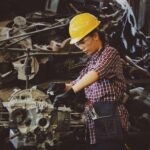Global research study by Fondazione MAIRE reveals Middle East perspectives
At COP28, Fondazione MAIRE is presenting a report which finds that delivering net zero by 2050 requires an energy transition that is as much about training people to design, build and use products and services differently as it is about decarbonising infrastructure to meet UN climate change targets.
The study highlights that the importance of education and training is particularly recognized in Middle Eastern countries (Saudi Arabia, the UAE, Turkey), Algeria, and Chile, where a substantial portion of individuals stress its importance and urgency. However, there’s a concern that educational progress is still too slow.
In Saudi Arabia, a majority of respondents, comprising 31%, advocate for companies to prioritize innovating products and services sustainably, while 29% believe in emphasizing training for skills development. Similarly, in the UAE, over a third, accounting for 37%, assert that companies should give precedence to educating employees for skill enhancement.
The report says the energy transition will see new businesses and jobs created in the renewable energy, technology and industrial sectors and in administration and civil society, which will need new workers with specific skills and competences and existing workers to reskill. It will also need strong leadership and commitment from governments, accompanied by effective policies, regulations and collaboration between countries, as energy systems become increasingly interconnected.
That process of investment, reskilling and collaboration will also present significant economic opportunity particularly for those countries that are early movers and understand the need to develop a workforce for the decarbonised future.
The study suggests that G7 countries have not embraced the need for reskilling and education as much as emerging economies and if that disconnect plays out into the wider economy it could see developing countries capitalise on the energy transition more effectively than established economic powers.
The whitepaper is based on global research among a sample group of highly educated people and key opinion leaders from 10 countries across four continents, together with analysis from MAIRE Foundation and Group. Among the key findings were:
- 96% had heard of the energy transition with around two-in-three respondents seeing it as a priority in their country with broad understanding that delivering this transition will create new roles and jobs
- 83% said they need training to improve their skills as part of the energy transition
- Around two-fifths (37%) said companies should prioritise the innovation of sustainable products and services
- More than a third (34%) said businesses need to adopt new production processes
- Around 40% of those polled said that the creation of skills and competences is crucial to drive the energy transition
- In this context, both hard and soft skills are pivotal in education. Soft skills include creativity and problem-solving and hard skills are expected to include elements such as environmental impact analysis and the knowledge of alternative raw materials and renewable energy sources
The required skills for future energy transition professionals vary across countries, but it’s evident that both technical and soft skills are crucial: something MAIRE refers to as creating Humanist Engineers – training people in technical and humanistic disciplines, providing them with knowledge on sustainability, and teaching critical thinking and creative soft skills. The emphasis on creativity (in UK, Algeria, Saudi Arabia, India and UAE), problem-solving (in Italy, Turkey, Saudi Arabia, China, the USA, and Chile), critical thinking and analytical skills (in UK), and analytical skills signals the need for new professionals with a different mindset.
At the same time, technical knowledge on environmental impact analysis (in the UK, the UAE, and the USA), alternative materials (in China), renewable energy sources (in Turkey, Saudi Arabia and Algeria), and circular economy principles (in India), is seen as pivotal. This reflects these countries’ awareness of the educational gaps that need to be addressed.
Fondazione MAIRE concludes that using existing technology is as important as developing new solutions and that requires a wider technical response to climate change, one that is equally focused on how people use technology, products and infrastructures as it is on designing new generations of low-carbon technology, products and services. Fondazione MAIRE believes that without a revolution in the way we train and equip millions of people needed to deliver net zero, we will fall short in building the infrastructure, products and services needed for mitigation and adaptation to climate change.
Commenting on the study, Fabrizio Di Amato, MAIRE Group and Fondazione MAIRE Chairman, said: “Addressing the energy and net zero transition needs us to embrace the concept of the ‘humanist engineer’ as a new type of transformation agent. These people will navigate complexity and find solutions that include technological innovation, attention to economic, environmental and social needs and cultural aspects. Our Group has set the contribution to climate goals as a priority in its strategic plan. We want to invest on the society evolution on a long-term basis and to create impact both through our technologies and through the social activity of our foundation. The skills that we can create today will make the real difference in twenty-five years.”
According to the IEA’s World Energy Employment Report, the energy sector employs over 65 million people in total, around 2% of global employment in 2019. To reach the net zero emissions goal, the transition could create 14 million clean energy technology-related new jobs, shift around 5 million workers from fossil fuels, and require additional skills and training for an estimated 30 million employees, according to the IEA’s landmark report Net Zero by 2050. In most cases, this will require developing both upskilling or reskilling.
Last Updated on 1 year by menews247












